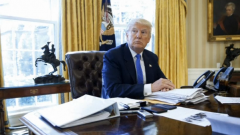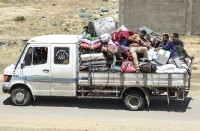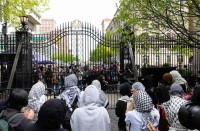
WASHINGTON, United States (Reuters) –United States President Donald Trump said on Thursday (February 23) he wants to ensure the US nuclear arsenal is at the “top of the pack,” saying the country has fallen behind in its atomic weapons capacity.
In a Reuters interview, Trump also said China could solve the national security challenge posed by North Korea “very easily if they want to,” ratcheting up pressure on Beijing to exert more influence to rein in Pyongyang’s increasingly bellicose actions.
In his first comments about the US nuclear arsenal since taking office on Jan. 20, Trump said he would like to see a world with no nuclear weapons but expressed concern that the US has “fallen behind on nuclear weapon capacity.”
“It would be wonderful, a dream would be that no country would have nukes, but if countries are going to have nukes, we’re going to be at the top of the pack,” Trump said.
Russia has 7,300 warheads and the US, 6,970, according to the Ploughshares Fund, an antinuclear group.
The new strategic arms limitation treaty, known as New START, between the US and Russia requires that by February 5, 2018, both countries must limit their arsenals of strategic nuclear weapons to equal levels for 10 years.
The treaty permits both countries to have no more than 800 deployed and non-deployed land-based intercontinental and submarine-launched ballistic missile launchers and heavy bombers equipped to carry nuclear weapons, and contains equal limits on other nuclear weapons.
Analysts have questioned whether Trump wants to abrogate New START or would begin deploying other warheads.
In the interview, Trump called New START “a one-sided deal.”
“It’s a one-sided deal. It gave them things that we should have never allowed,” Trump said.
Trump also complained that the Russian deployment of a ground-based cruise missile is in violation of a 1987 treaty that bans land-based American and Russian intermediate-range missiles.
“To me it’s a big deal,” Trump said.
Asked if he would raise the issue with Putin, Trump said he would do so “if and when we meet.” He said he had no meetings scheduled as of yet with Putin.
Speaking from behind his desk in the Oval Office, Trump declared that “we’re very angry” at North Korea’s ballistic missile tests and said accelerating a missile defense system for US allies Japan and South Korea was among many options available.
“There’s talks of a lot more than that,” Trump said, when asked about the missile defense system. “We’ll see what happens,” he said.
Asked about what steps China should take to reign in North Korea, Trump said: “I think China has tremendous control over North Korea, whether they say so or not is up to them, but they have tremendous control over North Korea. I think they could solve the problem very easily, if they want to.”
Trump’s meeting with Japanese Prime Minister Shinzo Abe earlier this month in Florida was interrupted by a ballistic missile launch by North Korea.
Trump did not completely rule out possibly meeting Kim at some point in the future under certain circumstances but suggested it might be too late.
“It’s very late. We’re very angry at what he’s done, and frankly this should have been taken care of during the Obama administration,” he said.
According to Japanese news reports, the Japanese government plans to start debate over the deployment of a U.S. missile defense system known as the Terminal High Altitude Area Defense, or THAAD, and the land-based Aegis Ashore missile defense system to improve its capability to counter North Korean ballistic missiles.
Japanese government sources told Reuters last year Japan may accelerate around $1 billion of planned spending to upgrade its ballistic missile defenses.
Trump vowed during his campaign to step up missile defense efforts and within minutes of his Jan. 20 inauguration, the White House announced that the administration intended to develop a “state of the art” missile defense system to protect against attacks from Iran and North Korea.
It did not provide details on whether the system would differ from those already under development, its cost or how it would be paid for.
At Thursday’s interview, Trump declared China the “grand champions” of currency manipulation, just hours after his new Treasury secretary pledged a more methodical approach to analyzing Beijing’s foreign exchange practices.
Trump said he has not “held back” in his assessment that China manipulates its yuan currency, despite not acting on a campaign promise to declare it a currency manipulator on his first day in office.
“Well they, I think they’re grand champions at manipulation of currency. So I haven’t held back,” Trump said. “We’ll see what happens,” he added.
During his presidential campaign, Trump frequently accused China of keeping its currency artificially low against the dollar to make Chinese exports cheaper, “stealing” American manufacturing jobs.
But Treasury Secretary Stephen Mnuchin told CNBC on Thursday that he was not ready to pass judgment on the Asian nation’s currency practices.
Trump also spoke favorably about a potentially export-boosting border adjustment tax being pushed by Republicans in the US Congress. He did not specifically endorse it, but said it could lead to a lot more jobs in the country.
“I certainly support a form of tax on the border because everyone else does. We are one of the very few countries, possibly the only country, that has no border tax, and that’s not a tax to the consumer. That’s going to be a tax to the companies and it’s going to be a tax to other countries much more than it is to the consumer. That’s a tax to to other countries,” Trump said.
Trump spoke to Reuters after meeting with more than 20 chief executives of major US companies to discuss ways to return manufacturing jobs to the country, which was one of the linchpins of his presidential campaign.







